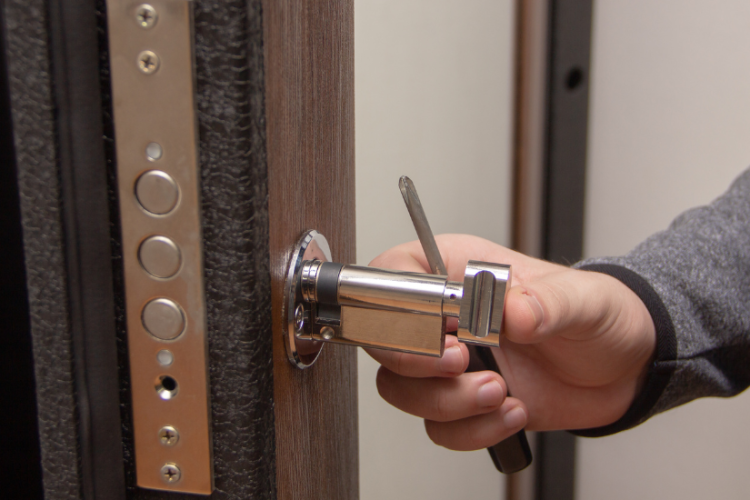
Replacing or Rekeying Locks? Making the Right Choice for Home Security
When it comes to home security, one of the first lines of defense is your locks. Locks are a crucial component of keeping your home safe from unauthorized entry, and the decision to replace or rekey them is an important one. In this article, we will delve into the world of locks, their lifespan, and the factors to consider when deciding between rekeying locks and replacing them. By the end of this read, you’ll have the knowledge needed to make an informed choice that suits your security needs, budget, and environmental concerns.
Understanding Locks and Their Lifespan
Before we explore the intricacies of lock replacement and rekeying, it’s essential to understand the types of locks and the factors that affect their longevity.
Different Types of Locks
Locks come in various types, each with its own set of features and characteristics. The primary types include deadbolt locks, cylinder locks, and smart locks.
1. Deadbolt Locks: These are the most common type of lock for residential doors, known for their robust and durable design.
2. Cylinder Locks: Often found in commercial settings, cylinder locks are versatile and can be rekeyed easily.
3. Smart Locks: These modern locks offer convenience and advanced security features, such as remote access control via smartphones.
Factors Affecting Lock Longevity
Several factors can impact the lifespan of your locks, regardless of their type.
1. Material Quality: High-quality materials like solid brass or steel tend to last longer than cheaper alternatives.
2. Environmental Conditions: Exposure to extreme weather conditions or corrosive environments can accelerate wear and tear.
3. Frequency of Use: Frequent locking and unlocking can lead to faster deterioration of lock mechanisms.
When to Consider Rekeying Locks

Rekeying locks is a cost-effective alternative to lock replacement. It involves altering the lock’s internal mechanism so that it operates with a new key while retaining the existing hardware.
What Does Rekeying Involve?
Rekeying locks is a process performed by a locksmith, where the lock’s pins and springs are replaced or rearranged to match a new key. This process typically costs less than replacing the entire lock.
Situations Suitable for Rekeying
Several scenarios make rekeying a viable option for homeowners.
| Lost or Stolen Keys | If you lose your keys or suspect they were stolen, rekeying your locks ensures that the old keys will no longer work. |
| Moving to a New Home | When moving into a new house, rekeying the locks is a wise choice to eliminate any keys held by previous occupants. |
| Security Concerns | If you are concerned about the security of your home but are satisfied with your current locks’ functionality, rekeying can provide peace of mind. |
Benefits of Rekeying
Rekeying offers several advantages that make it an attractive choice:
| Cost-Effective |
| Rekeying locks is generally more budget-friendly than replacing locks entirely. |
| Maintains Existing Hardware |
| You can keep your existing locks and keys, saving on the cost of new hardware. |
| Enhanced Security |
| Rekeying locks improves security by rendering old keys useless, giving you control over who has access to your home. |
When to Opt for Lock Replacement

While rekeying is suitable for certain situations, there are times when lock replacement is the better choice.
Signs of Locks Beyond Repair
If your locks are exhibiting signs of significant wear and tear or have malfunctioning mechanisms, it may be time to replace them.
| Malfunctioning Mechanisms | If you find it increasingly difficult to lock or unlock your doors, it’s a sign that the lock may be failing. |
| Excessive Wear and Tear | Visible damage, rust, or extensive wear can compromise the lock’s effectiveness. |
| High-Security Lock Options | Upgrading to high-security locks can provide better protection against lock-picking and forced entry. |
| Smart Lock Integration | Smart locks offer advanced features like remote monitoring and access control, ideal for modern security needs. |
Advantages of Lock Replacement
Lock replacement has its own set of benefits:
| Improved Security |
| New locks offer enhanced security features and are less susceptible to tampering. |
| Aesthetically Pleasing |
| Replacing locks can improve the overall appearance of your doors, enhancing curb appeal. |
| Long-Term Investment |
| Investing in new, high-quality locks can be a long-term solution for your home security needs. |
Cost Considerations
When deciding between rekeying and replacing locks, cost is a significant factor.
| Lock Replacement Costs | Rekeying Costs |
| Replacing locks involves the purchase of new hardware and installation fees, which can vary based on the type of locks chosen. | Rekeying is generally more affordable than lock replacement. Costs may include labor charges and materials for the rekeying process. |
DIY vs. Professional Services
Whether you choose rekeying locks or lock replacement, the method of implementation is crucial. You can opt for DIY or professional services.
Rekeying as a DIY Project
Rekeying can be a DIY project for those with the necessary skills and tools. However, it’s not suitable for everyone.
Pros and Cons – DIY rekeying is cost-effective but requires some locksmithing skills and can be time-consuming.
Necessary Tools and Skills – You’ll need a rekeying kit, patience, and some knowledge of lock mechanisms.
Lock Replacement by Professionals
Lock replacement is typically best left to professionals for various reasons.
Advantages of Professional Services – Locksmiths have the expertise to ensure proper installation and security.
Finding a Reliable Locksmith – Research and choose a reputable locksmith to guarantee a quality job.
Making the Decision – Factors to Weigh
When deciding between rekeying and replacing locks, consider the following factors:
| Security Needs | Assess your security requirements and evaluate whether rekeying is sufficient or if lock replacement is necessary. |
| Budget Constraints | Determine your budget and how it aligns with the costs associated with each option. |
| Environmental Concerns | If environmental impact is a concern, factor in the eco-friendly options mentioned earlier. |
| Aesthetics and Compatibility | Consider the appearance of your locks and whether new locks would complement your home’s design. |
| Long-Term vs. Short-Term Considerations | Think about whether you are looking for a temporary solution or a long-term investment in security. |
Making the Right Lock Decision
In the quest to safeguard our homes and loved ones, the choice between replacing or rekeying locks becomes a pivotal decision. Each option comes with its own set of advantages and considerations. As we conclude our exploration of this important topic, remember that the right choice ultimately depends on your unique circumstances.
Whether you opt for the cost-effective rekeying route or invest in brand-new locks for added security, what truly matters is that you take action to protect your home. Your safety and peace of mind are paramount.
So, assess your security needs, weigh your budget, consider environmental concerns, and choose the path that aligns with your individual priorities. In the end, a well-informed decision ensures that your home remains a haven of security and comfort for years to come.





